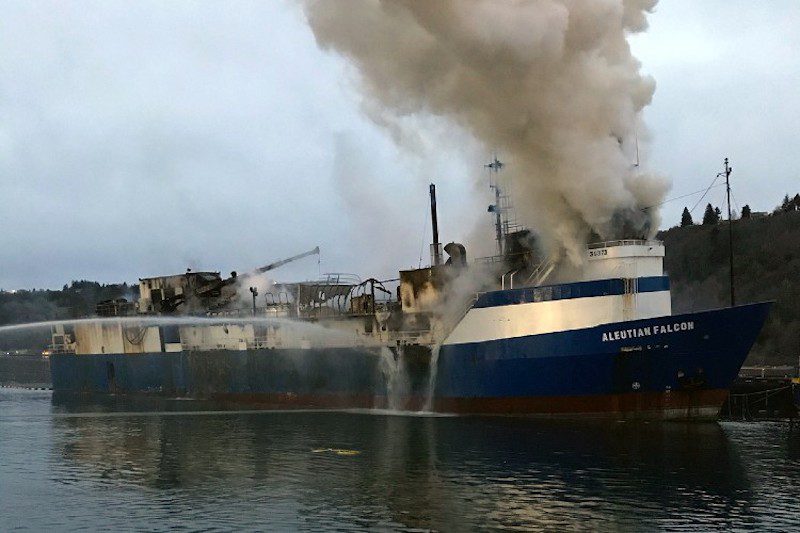Indian Navy Battles Engine Room Fire on Tanker in Gulf of Oman
The Indian Navy stealth frigate INS Tabar has responded to a distress call from the Pulau-flagged tanker MT Yi Cheng 6 in the Gulf of Oman on Sunday after the...

Inadequate planning for hot work led to a fire aboard a commercial fish processor while docked at a shipyard in Tacoma, Washington, the National Transportation Safety Board said in its investigation report released Thursday.
The fire was reported on the commercial fish processor Aleutian Falcon on Feb. 17, 2021 while the vessel was docked for repairs at a shipyard in Tacoma, Washington.
The Tacoma Fire Department responded and extinguished the fire four days later. No one was on board the vessel at the time of the fire, and there were no injuries reported. An estimated 20-30 gallons of hydraulic oil leaked into the water but were captured by a containment boom. The vessel was declared a total loss with an estimated value of nearly $16.5 million.
The NTSB issued Marine Investigation Report 22/10 on Thursday detailing its investigation into the accident and probable cause.
The Aleutian Falcon was docked for its maintenance and repair period in anticipation of the 2021 processing season. A section of corroded steel plating, located on the bridge deck above the pantry, dry stores area and walk-in refrigerator, was being cropped and renewed. The job was considered “hot work” since the tools used could produce sparks. Due to the location of the hot work, a marine chemist was brought on board to examine the areas involved. The marine chemist issued a marine chemist certificate that stipulated that work must be completed “without penetrating” the bridge deck, indicating he either was not aware or clearly informed of the full scope of the planned hot work, or he wrote the stipulation in error. The marine chemist certificate required all foam insulation within 12 inches of the area of planned hot work to be removed. The workers told investigators that they removed the foam insulation in the area of hot work; however, they did not remove a foam-filled wooden bulkhead separating the walk-in refrigerator space, adjacent to the pantry, which was combustible.
The fire most likely started near the wooden bulkhead, located directly below the area where hot work had been completed for the day. The hot work would have produced sparks and slag that likely travelled from the deck above (overhead) down to the wooden bulkhead, igniting the combustible materials in the area, as well as the bulkhead, and allowing for a smoldering fire to become established.
The NTSB determined the probable cause of the fire was the company’s supervisory personnel inadequately planning for hot work, as well as shoreside workers’ inadequately protecting hot work areas, allowing slag from hot work to ignite combustible material near an insulated wooden bulkhead of a walk-in refrigerator that had not been removed or sufficiently protected. Contributing was the ineffective communication between the supervisory personnel, marine chemist, and workers.
“It is critical for supervisory personnel to evaluate hot work areas for fire hazards to ensure that effected spaces are completely understood, prepared and protected for planned hot work in accordance with regulatory guidelines, company policies and marine chemist certificates,” the report said. “Adherence to proper policies and procedures is vital to completing a safe hot work operation. Additionally, crewmembers and personnel involved in hot work should be able to identify hazards and take action to remove or mitigate potential risks to the vessel.”
The NTSB previously investigated fires following hot work on vessels including the August 2016 fire aboard the passenger vessel Tahoe Queen, the May 2018 fire aboard the cargo ship Chipolbrok Moon and the December 2018 fire aboard the fishing vessel Jeanette. The NTSB found hot work safety policies were not followed in all three fires.
Read the report: Marine Investigation Report 22/10

Sign up for gCaptain’s newsletter and never miss an update

Subscribe to gCaptain Daily and stay informed with the latest global maritime and offshore news


Stay informed with the latest maritime and offshore news, delivered daily straight to your inbox
Essential news coupled with the finest maritime content sourced from across the globe.
Sign Up